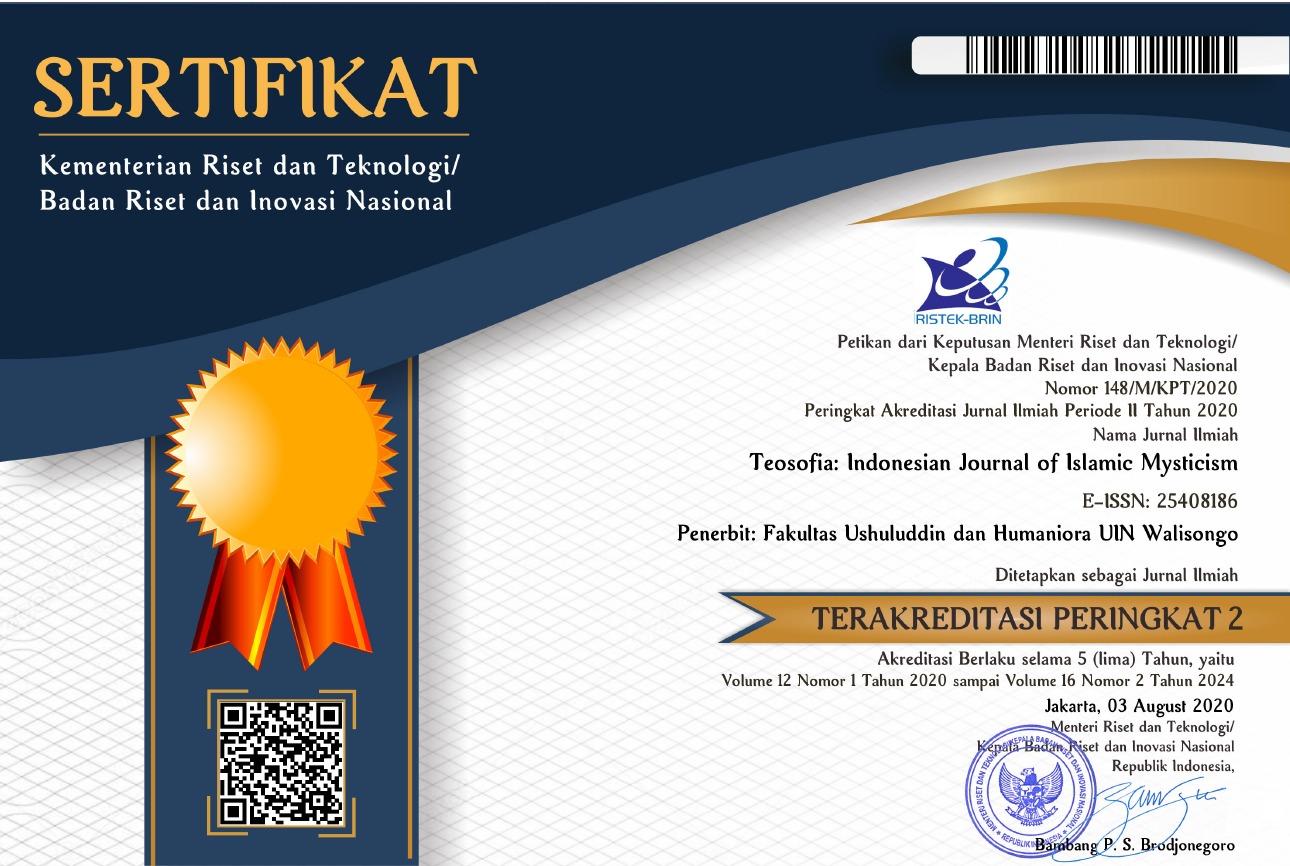The Role and Significance of Taṣawwuf in Modern-Day Crisis
DOI:
https://doi.org/10.21580/tos.v11i1.12030Keywords:
extremism, Islam, modern, spirituality, Taṣawwuf, violenceAbstract
The present manuscript aims to assess the important features of Taṣawwuf and its position in the contemporary world. Moreover, this study will help to understand the paramount role of Taṣawwuf in pulling out humanity from these crises and its importance in espousing the society in terms of socio-religious and spiritual development. The suggested methodology for this manuscript will be exploratory, descriptive, and historical to explore the contemporary importance of Taṣawwuf and its main characteristics. This study reveals the continuing significance of Taṣawwuf in modern times, where, religious extremism, violence, human value crises, social disharmony, and an imbalance between spirituality and mundane concerns of humanity are some issues that are confronting human beings in the contemporary world. Hence this study found that the legitimacy of Taṣawwuf in modern society still exists.
Contribution: This article makes a new discovery regarding the continued existence of Taṣawwuf and its role in maintaining peace, harmony, and religious tolerance in contemporary society and also reveals the role of Taṣawwuf in the spiritual development of human beings and maintaining a balance between the spirituality and mundane ends.
Downloads
References
Afzal, Avais. “Sufism.” In The Encyclopedia of Religion and Nature, edited by Braun Taylor and Jeffery Kaplan. London: Oxford University Press, 2005.
Ahmad, Israr. The Reality of Tasawuf. Translated by Basit B. Koshul. NSW: Islamic Library Australia, 2020.
Al-Bā’ūniyyh, ‘Ᾱ’ishsh. The Principles of Sufism. Edited and translated by Thomas Emil Homerin. New York: NYU Press, 2014.
Arberry, Arthur John. Sufism: An Account of the Mystics of Islam. London: Routledge, 1950.
Azra, Azyumardi. The Origins of Islamic Reformism in Southeast Asia. Networks of Malay-Indonesian and Middle Eastern ’Ulamā’ in the Seventeenth and Eighteenth Centuries. Southeast Asia Publications Series. Honolulu: University of Hawaii Press, 2004.
Begg, Mirza Wahiduddin. The Big Five of India in Sufism. Rajasthan: Rashtrapati Bhawan, 1972.
Bruinessen, Martin van, and Julia Day Howell, eds. Sufism and the “Modern” in Islam. London: I.B. Tauris, 2007.
Chushty, Yuwsf Salyīm. Tāryīkh-e-Taṣawwuf. New Delhi: Areeb Publications, 2015.
DeGorge, Barbara. From Piety to Politics: The Evolution of Sufi Brotherhoods. Washington DC: New Academia Publishing, 2005.
Gibb, Hamilton Alexander Rosskeen. Mohammedanism: An Historical Survey. New York: Oxford University Press, 1962.
Gill, Farhat. “The Ascetic Phase in the Development of Tasawwuf.” Pakistan Journal of History and Culture xxxii, no. 1 (2011): 131–43. http://www.nihcr.edu.pk/Latest_English_Journal/7.pdf.
Gulen, M. Fethullah. Key Concepts in the Practice of Sufism. Vol. 2. New Jersey: Tughra Books, 2007.
Hanieh, Hassan Abu. Sufism and Sufi Orders: God’s Spiritual Paths Adaption and Renewal in the Context of Modernization. Edited and translated by Mona Abu Rayyan. Jordan: Friedrich-Ebert-Stiftung, 2011.
Hossein, Nasr. Three Muslim Sages. New York: Caravan Books Delmar, 1976.
Howell, Julia Day. “Sufism and the Indonesian Islamic Revival.” The Journal of Asian Studies 60, no. 3 (August 26, 2001): 701–29. https://doi.org/10.2307/2700107.
Iqbal, Mohammad. The Reconstruction of Religious Thought in Islam. Lahore, 1930.
Iqbal, Muhammad. The Development of Metaphysics in Persia. Scholar Select. London, 1908.
Karamustafa, Ahmet T. Knowledge of God in Classical Sufism: Foundations of Islamic Mystical Theology. Translated by John Renard. New Jersey: Paulist Press, 2004.
Knysh, Alexander. Islamic Mysticism – A Short History. Vol. 1. Leiden: Brill, 2010.
———. Sufism-A New History of Islamic Mysticism. USA: Princeton University Press, 2017.
Lings, Martin. What Is Sufism? Lahore: Suhail Academy, 1983.
Macdonald, Duncan B. Development of Muslim Theology. New York: Charles Scribner’s Sons, 1903.
Massignon, Louis. Essays on the Origins of the Technical Language of Islamic Mysticism. Translated by Benjamin Clark. United States: University of Notre Dame Press Indiana, 1997.
Nasr, Seyyed Hossain. The Need for a Sacred Science. United Kingdom: Taylor & Francis e-Library, 2005.
Nasr, Seyyed Hossein. Sufi Essays. Germany: Schocken books, 1977.
———. Traditional Islam in the Modern World. London: Kegan Paul International Ltd., 1987.
Nicholson, Reynold Alleyne. The Mystics of Islam. London: Routledge, Kegan Paul, 1914.
Nizāmi, Khaliq Ahmad. Some Aspects of Religion and Politics in India During the Thirteenth Century. Uttar Pradesh: Aligarh Muslim University, 1961.
Nugroho, Wahyu. “Sufism and Interreligious Dialogue: The Naqshbandi Haqqani Sufi Order in Indonesia.” Teosofia: Indonesian Journal of Islamic Mysticism 10, no. 1 (April 29, 2021): 111–26. https://doi.org/10.21580/tos.v10i1.8459.
Schimmel, Annemarie. And Muhammad Is His Messenger: The Veneration of the Prophet in Islamic Piety (Studies in Religion). North Carolina: The University of North Carolina Press, 1985.
———. Mystical Dimension in Islam. Chapel Hill: the University of North Carolina Press, 1975.
Sells, Michael A. Early Islamic Mysticism. New Jersey: Paulist Press, 1996.
Sharīf, M.M. History of Muslim Philosophy. Vol. 1. Germany: Otto Harrassowitz Wiesbaden, 1963.
Sirriyeh, Elizabeth. Sufis and Anti-Sufis. New York: Routledge Taylor & Francis Group, 2013.
Topbas, Oman Nūri. Tasavvuf (Müslümanın Kendisiyle İmtihanında). Translated by Süleyman Derin. Istanbul: Erkam Publications, 2020.
Trimingham, John Spencer. The Sufi Orders in Islam. London: Oxford University Press, Ely House, 1971.
Underhill, Evelyn. Mysticism: A Study in Nature and Development of Spiritual Consciousness. Michigan: Christian Classics Ethereal Library, 1911.
Valiuddin, Mir. The Qur’anic Sufism. New Delhi: Motilal Banarsidass Publishers Pvt. Limited, 1959.
Walī-Allāh, Shah. Ham‘Āt. Translated by Mohmmad Sarwar. Lahore: Sindh Sagar Academy, 1946.
Downloads
Published
How to Cite
Issue
Section
License
Copyright
The copyright of the received article shall be assigned to the journal as the publisher of the journal. The intended copyright includes the right to publish the article in various forms (including reprints). The journal maintains the publishing rights to the published articles. Therefore, the author must submit a statement of the Copyright Transfer Agreement.*)
Licensing

This work is licensed under a Creative Commons Attribution-ShareAlike 4.0 International License.
In line with the license, authors are allowed to share and adapt the material. In addition, the material must be given appropriate credit, provided with a link to the license, and indicated if changes were made. If authors remix, transform or build upon the material, authors must distribute their contributions under the same license as the original.
_______
*) Authors whose articles are accepted for publication will receive confirmation via email and send a Copyright Transfer Agreement.








